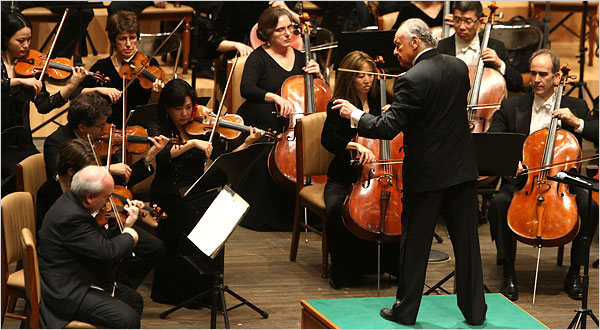Lorin Maazel conducting the New York Philharmonic perform the Korean folk song “Arirang”at the East Pyongyang Grand Theater in Pyongyang, North Korea, on Tuesday, February 26, 2008.
Reports say the North Korean audience and some orchestra members were in tears during the performance of “Arirang”.
ARIRANG – Korean Folk Song
“Arirang” is arguably the most popular and best-known Korean folk song, both inside and outside Korea. Arirang is an ancient native Korean word with no direct modern meaning. ‘Ari’ means “beautiful” (For example 아리따운 native Korean word means “beautiful”, “lovely”, “charming”) ‘Rang’ can mean “dear”. Because of those words, arirang could be interpreted to mean “beautiful dear”.
Below gives the refrain (first two lines; the refrain precedes the first verse) and first verse (third and fourth lines) of the standard version of the song in Hangul, romanized Korean, and a literal translation into English.
Arirang Verse 1
Romanization
Arirang, Arirang, Arariyo…
Arirang gogaero neomeoganda.
Nareul beorigo gasineun nimeun
Simnido motgaseo balbyeongnanda.
English
Arirang, Arirang, Arariyo…
I am crossing over Arirang Pass.
The man/woman who abandoned me [here]
Will not walk even ten before his/her feet hurt.
The standard version of Arirang has three verses, although the second and third verses are not as frequently sung as the first verse. They are listed below (excluding the refrain):
Verse 2
Cheongcheonghaneuren byeoldo manko
Urine gaseumen kkumdo manta
Just as there are many stars in the clear sky,
There are also many dreams in our heart.
Verse 3
Jeogi jeo sani Baekdusaniraji
Dongji seotdaredo kkonman pinda
There, over there that mountain is Baekdu Mountain,
Where, even in the middle of winter days, flowers bloom.
